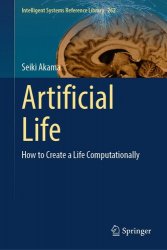 Название
Название: Artificial Life: How to Create a Life Computationally
Автор: Seiki Akama
Издательство: Springer
Год: 2024
Страниц: 147
Язык: английский
Формат: pdf (true), epub
Размер: 14.6 MB
This book provides some resources of Artificial Life. Artificial Life (ALife or A-Life) is the research area which simulates a life computationally. It involves several approaches to living systems in artificial manners. It was recognized as a scientific field in the 1980's. Artificial Life is related to many scientific fields including biology and computer science, and its history is old. In fact, the earlier works have been done by people like Turing and von Neumann.
Fields like that neural networks, evolutionary computation, and cellular automaton constitute the foundations for Artificial Life. The so-called wet ware is an approach in more biology-oriented, which is known that there are some Artificial Life Systems at present. It is expected to see further progresses of this exciting field.
The materials include: history, philosophy, related areas, recent developments, etc. Starting from the overview, the authors give an exposition of basic subjects like cellular automaton, neural networks, evolutionary computation, and wet ware. The authors also introduce some examples of Artificial Life Systems like Boids, Tierra, and Open Warm.
By the way, from the standpoint of the study of Artificial Life, there are four positions, i.e. software, hardware, biochemistry, and art. Artificial Life based on each position is often called the following three:
1) Soft ALife
2) Hard ALife
3) Wet ALife
4) ALife in Art
Soft ALife is an Artificial Life realized as a computer software. Examples in the category include cellular automata, neural networks, and Evolutionary Computation. Some of the theories in soft Alife have also been used for the research of Artificial Intelligence (AI). Its subfields and systems include artificial chemistry, complex adaptive systems, artificial ecology, digittal evolution, stringmol, etc. For example, complex adaptive systems (CAS) is a framework for studying, explaining, and understanding systems of agents that collectively combine to form emergent, global level properties.
Hard ALife is an Artificial Life realized as a computer hardware (or a machine). Examples in the category include self-replicating machine and robots. Its subfields and systems include evolutionary robotics, cognitive robotics, FloraRobotics, etc.
Wet ALife is an Artificial Life biochemically realized. Examples in the category include artificial bacteria, artificial cells, and synthetic biology. Its subfields and systems include Droplets, Xenobots, etc.
ALife in Art is manifested in a variety of ways, including computer-based, evolutionary life-systems (virtual ecologies); animated creatures with life-like behaviors (virtual creatures); living organisms and semi-living objects.
The book is intended for those, like experts and students, who wish to get involved in the field as a monograph or a textbook for the subject. It is also useful for beginners. But, the authors assume that the reader has mastered the material ordinarily covered in AI and mathematics.
Contents:
1. Introducing Artificial Life
2. Cellular Automata
3. Neural Networks
4. Evolutionary Computation
5. Wetware
6. Artificial Life Systems
7. Prospects of Artificial Life
Скачать Artificial Life: How to Create a Life Computationally
[related-news]
[/related-news]